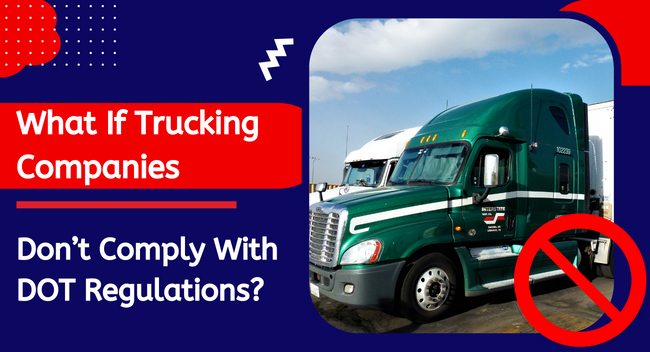
What If Trucking Companies Don’t Comply With DOT Regulations?
Before we understand what it would entail if you as a trucking company do not comply with DOT regulations, let’s know what DOT compliance is. DOT compliance is when you meet the standards that have been established by several rules and regulations laid down by the department of transportation and the federal motor carrier safety administration. If you end up violating any of these rules and regulations, it can lead to serious consequences.
You must know that commercial motor carriers are monitored regularly by relevant governing bodies. It is to ensure that they remain compliant throughout the year. As a trucker, it is your responsibility to understand that your equipment, registration, taxes, and also your operations are regularly monitored by the government in addition to various agencies such as the department of transportation.
If as a trucking company you do not comply with these regulations, you will be held in violation of them. Whether you manage two vehicles or a big fleet of 20, it is essential that you never violate any of the US department of transportation guidelines.
DOT compliance is also a very valuable and helpful preventive measure that is going to ensure the safety of your vehicles on US roadways. It is going to help you save lives in the event of an accident.
It is due to these efforts and the willingness of various carriers and trucking companies that the rate of annual fatalities and crashes has decreased drastically over the past few years. You should also stay DOT compliant if you want to avoid any fines and penalties that may be levied upon you.
DOT Violations – A Risk That You Cannot Take
You should be aware that roadside DOT inspections can take place at anytime and anywhere. If any DOT enforcement officer or personnel pulls you over, be assured that he is going to inspect every aspect of your operations and the vehicle as well.
Remember that DOT enforcement varies by state and this means that an officer might have the authority to pull you over for speeding as well. If your vehicle is found to be violating any DOT rules and regulations, it is going to trigger severe fines and penalties.
Let’s Have A Look At A Few Very Common DOT Violations That Can Be Easily Avoided
Commercial Motor Vehicle-Related Violations
- If the vehicle has been loaded in an improper way with misbalanced cargo or in a fashion that makes it unsafe to transport any materials whether they are hazardous or non-hazardous
- The commercial motor vehicle has any leakage which can be that of oil, fuel, or coolant
- If your commercial motor vehicle is not being maintained properly which may include low tire thread, inoperable headlights, and the like
Driver-Related Violations
- If your driver does not possess the required qualifications or license to drive the vehicle
- The driver has already exceeded the hours of service
- If the driver has failed to test or follow up on any of his drug or alcohol use assessment
Understanding The Impact Of DOT Violations On Your Company
Fines And Penalties
The very first impact of any DOT violations is fines and penalties. It could range from a minor amount to several hundred. If you are violating any hazardous materials regulations, the amount can exceed up to $79,000 per count.
Effect On Your CSA Score
The federal motor carrier safety administration runs the CSA program. This ranks carriers according to their CSA scores. There are various aspects that are considered here including traffic violations, vehicle maintenance, hours of service, and many more.
You don’t want your CSA score to rise. If it rises beyond a level, the FMCSA might decide to investigate your carrier.
Out Of Service Order
If you violate DOT regulations, you will likely get an out-of-service order. If the federal motor carrier safety administration decides to investigate and you overlook any of the DOT rules and requirements, they can revoke your license immediately.
Expensive Insurance
One more impact that violating any of these regulations is going to have is that insurance is going to become a lot more expensive for you. A higher CSA score is going to result in higher premiums and deductibles for you whenever you try to seek coverage.
The Best Way To Avoid DOT Violations
1. Educate Your Drivers About DOT Compliance
The very first step that you should take is to educate all your employees, safety-sensitive position holders, and drivers about the importance of DOT compliance. Train them on how to stay prepared for any DOT-related inspections that the FMCSA might order.
2. Encourage Safety Measures And Precautions
You should encourage the adoption of safety measures and precautions across your organization. Organize driver training classes and seminars to promote this culture throughout your company.
3. Audit Your Logs Regularly
You must audit the logs of your drivers regularly. Get a hold of the driver’s vehicle inspection report every 6 months. Go through the electronic logging device yourself to maintain compliance throughout your fleet.
4. Choose The Right Drivers
It is also very critical to choose the right drivers. They must have the most appropriate and adequate training for any of the responsibilities that they will be performing in your company. They must be skilled, experienced, and licensed to do the job.
5. Practice Preventive Maintenance For All Your Vehicles
Vehicle maintenance is also important. But do not leave it to the last moment. Make it a habit to practice preventive vehicle maintenance throughout the year.
6. Choose The Right DOT Compliance Facilitator
In the end, it becomes very essential that you choose the right DOT compliance consortium or third-party administrator. They are going to help you stay compliant throughout the year without you having to do anything on your own. You can concentrate on your business and leave all your compliance-related responsibilities on their able shoulders.
